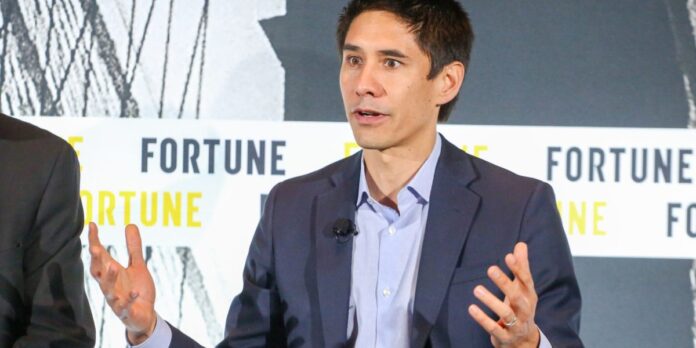That’s why he’s introduced some rules about who’s around when he works and where he goes when there are company matters to attend to.
Sutherland-Wong stated that he has implemented boundaries to ensure his children do not witness him working on weekends or late nights. Instead, he waits until his children are asleep to log in for work.
The CEO of Glassdoor for the past four years shared with CNBC Make It: “With [my] children, I want to lead by not having digital products all around, or being distracted by my email and text messages all the time.”
Working remotely five days a week provides him with flexibility, and if work does come up while he is with his children, he relocates to a home office instead of working in their presence.
Sutherland-Wong mentioned that his young children can sense when he is preoccupied with his emails instead of engaging with them.
To address this, he plans his day to be present when his children return from school, disconnect from work, spend quality time with them, put them to bed, and then resume work.
The balance of working parents
The 44-year-old CEO is not the first employee to recognize the conflict between parenting and the constant demands of work, especially with the influx of calls, emails, and notifications on smartphones and smartwatches.
This dilemma is termed “technoference,” when an individual is digitally distracted from those physically around them.
More than two decades ago, Stewart D. Friedman, an organizational psychologist at the University of Pennsylvania’s Wharton School, studied 900 business professionals and their interactions with their children.
In 2018, Friedman revisited his research in an article for the Harvard Business Review, exploring how it remains relevant today.
His findings revealed that various factors, such as control over workload and the impact of work on family life, influenced children’s behavior.
Friedman highlighted the importance of parents’ psychological presence, particularly the father’s cognitive interference from work on family time, which could lead to emotional and behavioral issues in children.
For working mothers, the study indicated that those with autonomy and discretion over work had mentally healthier children. Additionally, mothers dedicating time to self-care rather than solely on housework resulted in positive outcomes for their children.
According to Friedman, it’s not just about mothers being at home or work, but also about how they spend their non-work time at home.




